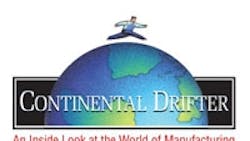If you were young and ambitious in the 1990s, Prague was the place to be.
The Czech Republic was the most accessible of the newly free Eastern European countries, and Western firms of every description were charging in with elbows flying, looking for market share, brand recognition, or bargain-priced manufacturing facilities. Along with those companies came an army of youthful ex-patriots -- Europeans and Americans, all graduates of respected universities, and all willing to gnaw off their own hands to get a chance at boots-on-the-ground experience in international business.
One evening back then, I sat in a Prague pizza parlor with more than half a dozen such worldly young workers. They were in their 20s and early 30s, and they hailed from the United States, France, Germany and Italy. Only one -- Stefan -- was Czech, and he served as informal master of ceremonies for the get-together.
To an American, Stefan was a remarkable character. It wasn't his obvious intelligence, grasp of issues, or quick wit that impressed, however. It was his ability to slip effortlessly between his native tongue and English, French, Italian, and German. In a pinch, he said, he could muster a few words of Slovenian and Croatian, too.
Stefan's linguistic dexterity was something to see. Then again, everyone present was a polyglot to some degree -- except the two Americans, both of whom held MBAs from prestigious schools of business, and both of whom were employed in managerial positions in the Prague offices of high-powered U.S. firms.
With the possible exception of Kyrgyzstan, no country on earth has so ignored the necessity to teach foreign languages as the United States. It's true that English is today's lingua franca, but not everyone on the planet is equally fluent in the universal language of business. Just try cutting a deal with a Chinese supplier who knows only Mandarin and see how far you get.
Young Americans are allowed to leave universities and graduate schools with fancy degrees but no working knowledge of German, Chinese or Japanese. A fair percentage can't even speak English as well as their counterparts overseas, and horrifyingly minuscule numbers can write an intelligible sentence. Does anyone in the United States under the age of 35 know the difference between "your" and "you're" anymore?
Multilingualism is a genuine competitive advantage -- one that will only grow more valuable over time. In fact, if I were an HR director of an American company, my test of any job candidate would consist of a simple questionnaire:
- Ever killed anyone?
- What languages do you speak and read fluently?
- What is the difference between "your" and "you're"?
If my intent were to make a hiring decision predicated on the future best interests of my company, that's all I'd need to know.
And if a candidate's answers to the second and third queries were sufficiently impressive, I might even be willing to overlook his response to Question 1.
